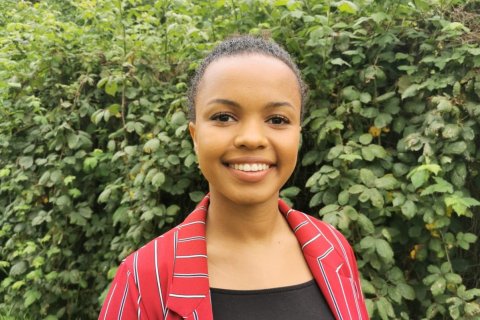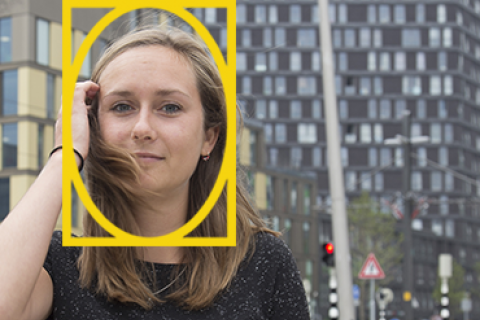Testimonials
Djennifer Madzia-Madzou, alumnus Medical Imaging

"After my bachelor's program Nanobiology at TU Delft I was looking to apply my theoretical technical skills into something challenging and at the same time useful for society. Looking back, I am very happy with the choice I made to continue my studies with this Master's. I will point out the main reasons for this.
This program attracts students with different technical backgrounds. And there are plenty of courses to further educate yourself in the field you want to specialize in. The program offers a lot of flexibility to pursue your own interests. The field of medical imaging is broad and ranges from MRI physics to radiotherapy and computer aided diagnosis. The teachers are knowledgeable, and the classes feel personal due to the size of the group. Additionally, there is a good balance between theoretical courses and practical assignments. When you actually get to apply the theory to a specific problem, you can see how this field requires a combination of creativity and theoretical understanding. Those were the moments that convinced me to do a PhD, to my own surprise.
One of the biggest advantages is that the master's is located inside a highly specialized hospital with an eye for research. To have a medical context to the problems you are solving, is a great motivator to want to learn more. Additionally, the cooperation with the clinicians brings a tremendous amount of added value since they know where the limitations of their own work are. Together we can then figure out how technology could provide added value to their workflow. That is also how my PhD project started, so now I am working on using artificial intelligence to predict vertebral collapse fractures in patients with multiple myeloma. This task is something that the clinicians are unable to do and could greatly improve the quality of life for these patients.
Another big benefit of this program is that the faculty is always willing to help students find a project that is fit for them. Having connections through academics opens a lot of doors when it comes to finding internships in the UMCU, in a company and/or abroad. This is also how I connected with the research group I was interning for abroad. Next to having a lot of fun that experience was also very useful, since you can observe how different research groups operate."
Rosina Derks, student Medical Imaging

"For my Master’s I found it important that the programme had elements of physics included in the curriculum. Next to this I was curious to see how physics could be used in different settings. I was not yet familiar with the field of medical imaging and this programme seemed to fully fit my interests. So far I am pleased with the direction I have chosen: medical imaging combines different fields of science, giving you the opportunity to get acquainted with them while being surrounded with state-of-the-art technology.
I am currently doing my internship at UMC Utrecht. In my research I am using diffusion MRI on the nerves and spine in the neck to gain more information about their physiological properties. My goal is to see how the fundamental knowledge I have acquired during my Bachelor’s in physics can be applied in a clinical setting and how it can contribute to the well-being of people through medical imaging. I have been surprised to learn that medical imaging is used in so many different settings, from working on new protocols for MRI to creating an automated image segmentation method using deep learning. It is a big research area and a big part of the future of medicine.
So far in the programme I have followed diverse courses, electives and my current major research project. Everyone in the programme has different educational backgrounds, from physics to biomedical science to computer science. Because classes are small you get a lot of support and you really get to know your fellow students and the teachers. The fact that it is a joint programme with Eindhoven is a big strength. the programme combines a solid technological basis with direct links to medical applications in the UMC Utrecht.
The broad programme introduces you to many research areas which will eventually give you the opportunity to make an informed choice about which potential direction you want to take, guided by the programme coordinators. The programme is taught by experts from the field who also work at UMC Utrecht – so they have both a fundamental and applied perspective. As a student, you get a close look at the research environment of medical imaging and what it would be like to do a PhD. You can also get a glimpse of industry, since many companies are involved. Later this year I will do an internship abroad, hopefully at a company, in order to experience both environments."

